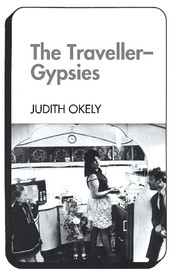Book contents
- Frontmatter
- Contents
- Dedication
- Preface
- 1 Historical categories and representations
- 2 Modern misrepresentations
- 3 Methods of approach
- 4 Economic niche
- 5 Self-ascription
- 6 Symbolic boundaries
- 7 Gorgio planning
- 8 Travelling
- 9 The trailer unit, spouses and children
- 10 Group relations and personal relatives
- 11 Gypsy women
- 12 Ghosts and Gorgios
- Concluding remarks
- Extract from The Scholar Gypsy
- Notes
- References
- Index
12 - Ghosts and Gorgios
Published online by Cambridge University Press: 04 December 2009
- Frontmatter
- Contents
- Dedication
- Preface
- 1 Historical categories and representations
- 2 Modern misrepresentations
- 3 Methods of approach
- 4 Economic niche
- 5 Self-ascription
- 6 Symbolic boundaries
- 7 Gorgio planning
- 8 Travelling
- 9 The trailer unit, spouses and children
- 10 Group relations and personal relatives
- 11 Gypsy women
- 12 Ghosts and Gorgios
- Concluding remarks
- Extract from The Scholar Gypsy
- Notes
- References
- Index
Summary
Different explanations
Compared to other rites de passage there is an elaboration of ceremony in the Travellers' response to the death of one of their members. As with birth, death is associated with pollution. The Gypsies' funeral rites and their inordinate and continuing fear of ghosts or the mulo have attracted the attention of Gypsiologists. Leland compared the Gypsies with the positivists who ‘seem to correct their irreligion through the influence of love’ and whose ‘real religion … consists … in devotion to the dead’ (1893:48-9). Like others he saw the Gypsies' attitude as admirable piety. Thompson can provide no satisfactory explanation of ‘origins or motives’ (1924:8) for the Gypsies' death rites, which include the destruction of the deceased's property. Recently, Trigg has presumed a merely chronological explanation: ‘The ancient origin of such a complete rite of disposal by destruction may very well have its origins in the funeral practices which many Indian Gypsies and Hindus have in common’ (1975:129). In his unpublished doctoral thesis (1967), and in an article in the J.G.L.S., Trigg deplores the evangelists' lack of interest in the Gypsies' beliefs which he considers could be exploited for Christian conversion: ‘Magical beliefs, for instance, strongly based on the idea of death and ghost life might possibly, with proper application, be replaced with the religion based on death and resurrection’ (1968:100). Elaboration of ceremonial and intense fear of the dead have been recorded among Gypsies elsewhere, for example in the U.S.A., France and Austria (Otter 1931:114-16).
- Type
- Chapter
- Information
- The Traveller-Gypsies , pp. 215 - 230Publisher: Cambridge University PressPrint publication year: 1983

